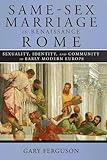Same-sex marriage in Renaissance Rome : sexuality, identity, and community in early modern Europe / Gary Ferguson.
Material type: TextPublisher: Ithaca ; London : Cornell University Press, [2016]Copyright date: �2016Description: 1 online resource (216 pages)Content type:
TextPublisher: Ithaca ; London : Cornell University Press, [2016]Copyright date: �2016Description: 1 online resource (216 pages)Content type: - text
- computer
- online resource
- 9781501706004
- 1501706004
- Bibel R�omerbrief
- Same-sex marriage -- Rome
- Same-sex marriage -- Europe -- History
- Gay men -- Europe -- Attitudes
- Homophobia -- Europe -- History
- POLITICAL SCIENCE -- Public Policy -- Cultural Policy
- SOCIAL SCIENCE -- Anthropology -- Cultural
- SOCIAL SCIENCE -- Popular Culture
- RELIGION -- Christian Church -- History
- Gay men -- Attitudes
- Homophobia
- Same-sex marriage
- Europe
- Rome (Empire)
- Eheschlie�ung
- Gleichgeschlechtliche Ehe
- Rome
- 306.84/809409024 23
- HQ1034.R6 F47 2016eb
Includes bibliographical references and index.
A French writer visits: Montaigne's travel journal and a thrice-told tale -- "Our marriages"? Male to male: Like husband and wife -- Marriage: rites, analogues, meanings -- Other witnesses, other stories -- Final hours: wills and execution -- Voices on trial: beginning with Battista the boatman -- Saint John at the Latin Gate: Marco Pinto -- Marriage as alibi, as euphemism, as recruitment -- Marriage and community -- Looking forward: Looking Back: The History of Sexuality -- Ghost stories: queer history.
"Same-sex marriage is a hotly debated topic in the United States, and the world, today. From the tenor of most discussions, however, it would be easy to conclude that the idea of marriage between two people of the same sex is a uniquely contemporary phenomenon. Not so, argues Gary Ferguson in this remarkable book about a same-sex wedding ceremony in sixteenth-century Rome. The case in question involved a group of mostly Spanish and Portuguese men, arrested and executed in Rome in 1578, said to have performed same-sex wedding ceremonies in one of the city's major churches. We know about the incident from a number of sources, including the travel journal of the French essayist Michel de Montaigne. Several substantial fragments of the transcript of the men's trial have also survived, along with copies of their wills. Making use of all these documents, Ferguson brings the story to life in striking detail. He reveals not only the names of the men but also where they lived, how they were employed, and who their friends were. In particular, he unearths a surprising amount of detail about the men's sex lives, and how others responded to this information, which allows him to explore attitudes toward marriage, sex, and gender at the time. Emphasizing the instability of marriage in premodern Europe, Ferguson argues that same-sex unions should be considered part of the institution's complex and contested history"--Provided by publisher.
Print version record.
eBooks on EBSCOhost EBSCO eBook Subscription Academic Collection - Worldwide

